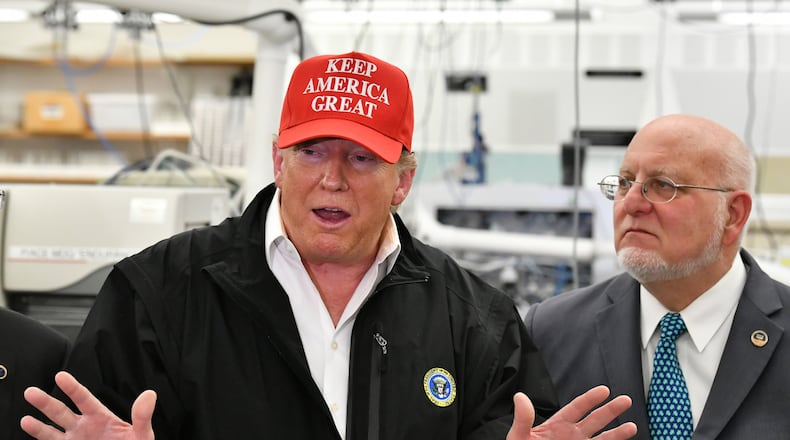President Donald Trump plans a quick trip to Atlanta on Wednesday to announce major changes to a decades-old federal policy that the White House said would speed the process for new transportation projects.
The president is scheduled to arrive at Hartsfield-Jackson International Airport around 3 p.m. and will head directly to the UPS Hapeville hub in the airport complex, meaning that the impact on traffic should be limited.
He’s set to leave around an hour later to return to Washington and has no fundraisers or other events planned during his brief trip to Atlanta. He’s confronting a very different political environment than his last trip to Georgia just a few months ago.
>>More: Trump to confront a very different Georgia with Wednesday’s visit
Trump’s November rival, former Vice President Joe Biden, criticized the Republican’s “complete and utter failure” to lead the country and combat the spread of the coronavirus on Wednesday. And state Sen. Nikema Williams, the head of the Democratic Party of Georgia, slammed Trump for touting a campaign promise rather than checking in with people suffering from COVID-19.
“We know that this is just another attempt to cover his broken promises as our roads continue to crumble and the country braces for the heavy economic impact of COVID-19,” Williams told reporters ahead of the president’s arrival.
The policy changes Trump will unveil center on a Nixon-era law known as the National Environmental Policy Act that requires federal agencies to study the environmental impact and take public comments on proposed infrastructure projects before permits are issued.
The Trump administration is expected to set in motion changes Wednesday that shorten the NEPA environmental review process to roughly two years. It’s also likely to restrict how federal agencies can take climate change into account when approving new projects.
NEPA’s critics, including chemical firms and energy companies, say the process is too burdensome for building new highways, pipelines and power plants. Opponents, they warn, can hold up projects for years in court, driving up the costs or blocking them entirely.
“It’s become an incredibly cumbersome and confusing process for many projects,” said Brent Fewell, an EPA adviser under the George W. Bush administration who’s now general counsel at the conservative-leaning ConservAmerica.
“What happens is a lot of investors eventually pull out, or the project essentially just withers on the vine.”
Recently, NEPA lawsuits slowed the Keystone XL and Dakota Access pipeline, two projects supported by the president.
“The idea is simply to create more certainty and clarity in the process,” Fewell told the AJC.
Environmental and racial justice groups are opposed to the move. They cast NEPA as a safeguard for low-income and minority communities that are disproportionately located near heavy-polluting industrial operations.
“This is a federal law that protects everybody’s neighborhood as if it were Buckhead,” said Neill Herring, a lobbyist for the Georgia Sierra Club. “Removing that protection is criminal, particularly given the current dialogue on race in this country.”
Ahead of the president’s visit, top Georgia Democrats framed Trump as blind to the racial disparities of the nation, particularly on environmental justice issues.
“We know that his disregard and disdain for the challenges that face the underprivileged, racial minorities and those that face the challenge of climate action are going to be ignored by his processes,” said Stacey Abrams, the 2018 Democratic gubernatorial nominee who now heads the Fair Fight voting rights group.
Savannah Viar, a Trump spokeswoman, said the president’s visit makes clear that “the Trump Administration is constantly working to improve the lives of every American, especially in Georgia.”
In Georgia, environmentalists view the Savannah Harbor deepening project as an example of the success of the NEPA process.
The dredging of the port would have threatened nearby wetlands, harmed local drinking water and imperiled a local sturgeon, according to the Natural Resources Defense Council. But a deal was struck to secure water quality monitoring and preserve wetlands.
Former Republican Congressman Jack Kingston, whose Savannah-based House district included the port, views things differently. He said environmental groups “used and abused” the NEPA process to drag out the project’s timeline based on details and technicalities.
“It just took forever,” said Kingston, who since leaving Congress has lobbied on behalf of the Georgia Ports Authority. “Every time we came up with something that everybody had previously agreed on, they would change their mind and want something else.”
The White House invokes another Georgia-based project that could benefit from the NEPA overhaul: The long-planned $2 billion expansion of Interstate 75 south of metro Atlanta to speed truck traffic along the busy corridor. A 2017 state audit questioned whether the project, which is slated to be completed in 2028, was needed in the first place.
The Latest
Featured





